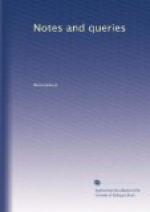Dr. Dee’s Petition.—There is no mention of Dr. Dee’s petition to King James in the list of his works in Tanner’s Bibliotheca Britannica; but in Beloe’s Anecdotes, vol. ii. p. 263., is an account of the preface to a scarce work of his, in which he defends himself from the charge of being a conjurer, or caller of divels, &c.
Tanner mentions his Supplication to Queen Mary for the Recovery of Ancient Writings and Monuments.
I fear, however, that your correspondent is {188} acquainted with these more easily obtained accounts of Dr. Dee’s works.
the Dictionary of M. l’Abbe Ladoocat states that he died in England, A.D. 1607, at the age of 81; so that his petition to James must have been made at the close of his life.
HERMES.
Lines quoted by Goethe.—I beg to inform your correspondent “TREBOR,” that he will find the lines quoted by Goethe in his Autobiography, in Rochester’s Satire against Mankind.
J.S.
Queen Mary’s Expectations.—Most persons have heard of the anxiety of Queen Mary I., for the birth of a child, and of her various disappointments; but many may not be aware that among the Royal Letters in the State Paper Office, are letters in French, prepared in expectation of the event, addressed by Queen Mary, without date, except “Hampton Court, 1555” (probably about May), to her father-in-law, the Emperor Charles V., to Henry II., King of France, to Eleonora, Queen Dowager of France, to Ferdinand I., King of Bohemia, to Mary, the Queen Dowager of Bohemia, to the Doge of Venice, to the King of Hungary, and to the Queen Dowager of Hungary, announcing to each the birth of her child, the word being so written fil, as to admit of being made filz, or of an easy alteration to the feminine fille, if necessary.
J.E.
Ken’s Morning and Evening Hymns.—I saw it mentioned in a review in the Guardian some few weeks ago, as one merit of the last edition of the Book of Common Prayer, published by Eyre and Spottiswoode, that it had restored Bishop Ken’s Morning and Evening Hymns to their original purity.
I have no means of accurately testing this assertion by reference to any undoubted version of the date of the original publication, but I have no doubt that this might easily be done through the medium of your paper; and I think you will agree with me that, if it should be substantiated, not only is credit due to the Queen’s printers, but also that it is an example which ought to be followed, without exception, in all future editions of the Prayer Book.
The variations, which I have noted in the ordinary version of the Hymns, as given in other Prayer Books, are too numberous to be inserted here, not to mention the omission of several stanzas, three in the Morning Hymn, together with the Doxology, and one in the Evening Hymn.
If they be false readings, no doubt they have been allowed to creep in inadvertently, and need only pointing out to be corrected. It occurred to me that this might be done more effectually in your columns, and I venture to hope that you will not consider it a task unworthy the high aim which you have in view in your admirable publication.




